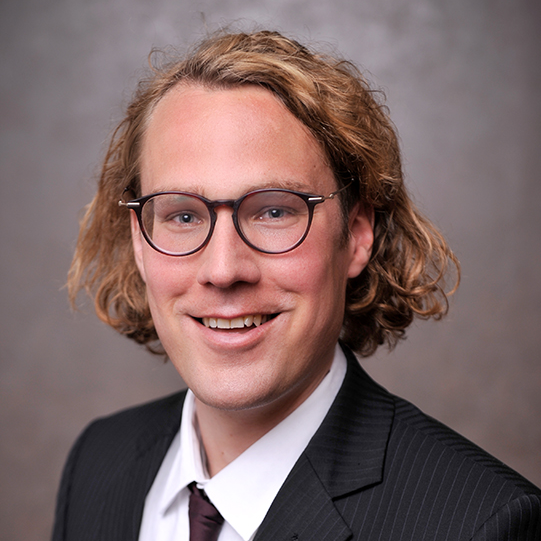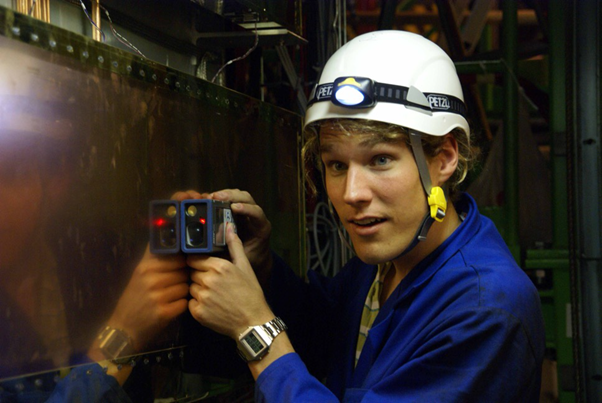TPP Alumni Insights: Roman's Experience as the First MAS TPP Alumnus

Technology and Public Policy (TPP) Alumnus Roman Welsing Shares his MAS TPP experience and how the TPP Programme Shaped his Career at the Intersection of Technology and Public Policy
- Roman graduated from the Technology and Public Policy (TPP) Programme in 2024, as the very first MAS TPP (Master of Advanced Studies in Technology and Public Policy) alumnus
- He originally studied Physics and earned his PhD in Astroparticle Physics at the German National Research Centre for fundamental science DESY (Deutsches Elektronen-Synchrotron)
- After leaving physics, he worked at a law firm and trained as a patent attorney
- After finishing the MAS TPP, Roman was awarded the “Science Meets Politics” fellowship, a postdoctoral scholarship offered for Physicists by the Heraeus Foundation, which allows the fellows to accompany a member of the German Parliament for three months at the Bundestag
- He now works as a technology manager at the Technical University of Munich (TUM)
Roman, you are not only our first MAS TPP alumnus, but you also have quite an interdisciplinary career path. What motivated you to apply for the TPP continuing education programme along this journey and particularly what motivated you to choose the MAS, instead of only a CAS?
Yes so, I'm a physicist and I originally studied in Berlin, at ENS Lyon, and I also spent three months at CERN in Geneva. Then, I completed my PhD in Astroparticle Physics at the German National Accelerator Research Laboratory, DESY it's called. After that, I decided to leave physics and I started a patent attorney traineeship in Munich, to some part also because it's a broader profession, not as specialised as research. I took the exam after I worked in a law firm for more than two years and was finally trained at the German Patent and Trademark Office and the Federal Patent Court for 8 months. After the exam, I worked for the Fraunhofer-Gesellschaft for applied research. And when they offered me the possibility to take a sabbatical for a couple of months, this allowed me to go to Zürich where I decided to do the CAS TPP: Impact Analysis, at ETH Zürich.
I generally applied to the TPP programme because of its content, and its interdisciplinary and international approach. It covers a broad range of subjects and scientific disciplines, from economics to behavioural aspects, and yet allows us to understand public policies and administration in a very generalistic way. That’s one of the main reasons why I chose this programme. And on top of that, ETH Zürich is also just a very reputable and well recognised name, which factored into me looking into the programme.
In Germany, Certificates of Advanced Studies (CAS) are not as common or well-recognised, which was a big reason why I was certain quite quickly that I wanted to study the whole Master of Advanced Studies (MAS) programme and go on after finishing the CAS TPP: Impact Analysis. So, I decided that I also wanted to do the MAS while I was taking the CAS and thus took the electives right away, as most of them are on a weekly basis and I was present in Zürich for the whole semester anyways.
“I generally applied to the TPP programme because of its content, and its interdisciplinary and international approach.”Roman Welsing

What made this particular programme the right choice for you?
I really liked the CAS TPP: Impact Analysis; it had quite an empirical approach covering field experiments to investigate the impact of public policies and also to choose among the best ways to improve people's lives. And then after that, attending the CAS TPP: Policy Process was even more interesting, it gave me insights into the international political system, the craft of administrating and managing public issues. What I also really liked about the programme was that it wasn’t restricted to Switzerland, but it had a very global perspective, it put everything into the international frameworks.
In the end, the MAS just rounded off my experience really well. The CAS was mainly just courses and smaller exams, but the MAS included the electives on top of that, where I was able to take classes from a broad range of subjects, philosophy, history, and science communication, covering all my interests. And to finish, the thesis project allowed me to really apply what I had learned, put it into practice, and get a final result in the end.
“What I also really liked about the programme was that it wasn’t restricted to Switzerland, but it had a very global perspective, it put everything into the international frameworks. ”Roman Welsing
Looking back, what were some of the most valuable insights or memorable aspects of your experience in the MAS TPP?
From a personal point of view, we were a very small group back then, less than ten students, and our experience was quite special as we were like a small family. We spent our whole time at ETH together, which was really nice, especially for me as an international student. It was a very warm, welcoming group of people.
From a professional perspective, I especially enjoyed the classes on political communication and the writing workshop, I learned a lot during that time. The broad range of classes allows you to cover your passions, but also leave your comfort zone a bit, to branch out, learn, and improve.
Another strength of the programme was the emphasis on empirical and experimental methods. A topic that I enjoyed in particular was on the practice of random control trials (RCTs). It's not very well known in the public administration, in my opinion, or at least not known enough. It can really improve public administration processes and outcomes for the sake of welfare.

How did the MAS TPP influence your career overall?
Well, for me, pursuing the MAS TPP was primarily a decision for my personal development rather than for my career. But on top of that, it allowed me to transition from the patent business to a more general position in technology management, where I am now at the Technical University of Munich. I do think what I learned through the TPP programme helps me in my professional everyday life. It's not only about the courses, but the whole experience. Taking the MAS TPP can certainly also help you make up your mind, about where you want to go, and you may find new possibilities that weren’t accessible before or you weren’t aware of. So yes, the programme was certainly valuable and instrumental for me.
“Taking the MAS TPP can certainly also help you make up your mind, about where you want to go, and you may find new possibilities that weren’t accessible before or you weren’t aware of. ”Roman Welsing
In 2024, you were awarded the “Science Meets Politics” fellowship, which allowed you to accompany a member of the German Parliament for three months. During this time, you gained insights into parliamentary processes, while also contributing your own expertise.
How did the MAS TPP influence this experience? Were there specific aspects of the programme that helped you or that you were able to apply during your time at the Bundestag?
Yes, I was able to spend three months at the Bundestag, the German parliament, for the Science Meets Politics Fellowship. So, the MAS TPP certainly opened some doors for me. At the Bundestag, my primary task was to give scientific input, but knowing about the political system and procedures definitely helped me settle in an environment I was not familiar with at all, and which rather surprised me as a scientist. The TPP programme additionally influenced this experience by enhancing my soft skills, which was certainly helpful. Of course, the training in some technological aspects, such as climate change and energy policy, was very useful as well, for which the programme offers dedicated elective courses and a lot of training in these areas. So also from a technological and scientific standpoint, the TPP programme offers a lot to move forward.
“The MAS TPP certainly opened some doors for me.”Roman Welsing

What advice would you give to professionals seeking to transition into roles at the intersection of technology and public policy?
Well, the market for continuing education programmes, I think, is very big and there are a lot of options. But for me it really was the best one, so I'm very happy I did this. It suited my needs, my interests, and it also worked out for me in the end to get where I wanted to go, so I think it's a great opportunity. ETH Zürich surely is well known and recognised, which is nice to have, but in the end, it's your abilities and ultimately the content of the programme that matters most. You should not do it for the grades or the credits, but for the learning experience and your personal progress, which you really can benefit from with the TPP programme.
Discover more about the Technology and Public Policy (TPP) Programme and the MAS TPP.